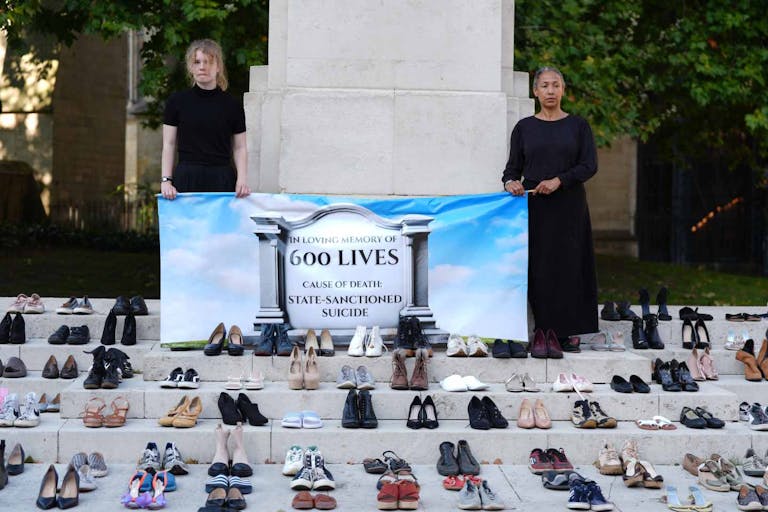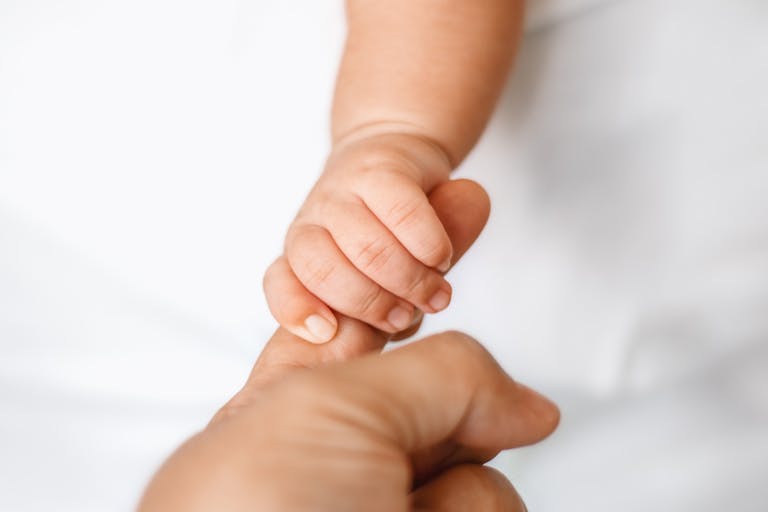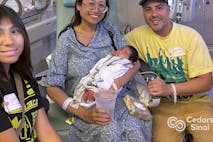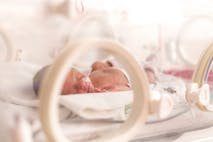
International group warns against normalizing assisted suicide and euthanasia
Angeline Tan
·
Human Interest·By Nancy Flanders
One mom’s mission to undo decades-old adoption stigma and help birth moms see the ‘big picture’
Because of the enormous sacrifice of a birth mother who chose life for her baby girl, Terri Marcroft’s adopted daughter Sydney was given the opportunity to grow and thrive under the care of her adoptive parents. Her teenage birth mother was also able to remain in contact with her through open adoption, while she moved forward with her life. This experience is what led Marcroft to found the pro-adoption organization Unplanned Good.
“We’re still trying to fight stigmas about adoption from decades ago,” Marcroft explained to Live Action News regarding her adoption advocacy and education work. “Adoption has gone from completely closed to mostly open. That means that the birth mother is in the driver’s seat. She gets to choose [the adoptive parents] and meet them beforehand.”
According to Marcroft, over 90% of adoptions in the United States today are open to some degree, which she says has been proven to be “much healthier for everyone involved.”
“Secrets are replaced with transparency now. There’s no lying, no pretending the child wasn’t adopted. All is out in the open,” she said. “The [birth mothers] aren’t being forced into [adoption] like they were when I was in high school. They are choosing it themselves because they are pregnant and want to choose life, then turn it into something good for another family. My daughter knows the whole story and why [her birth mother] chose adoption, why she didn’t choose to parent. Kids blame themselves if you don’t tell them the truth.”
How adoption benefits birth mothers
There’s a misconception that abortion is easier for a pregnant woman than adoption. Though both involve trauma, abortion involves the intentional death of the child, which can come with a lifetime of regret and grief. Women who abort their babies are at an increased risk of drug use, alcohol abuse, depression, and suicide. With the advent and increase of open adoption, the trauma of adoption for the birth mother and the baby can be greatly reduced, as they have the opportunity to be a part of one another’s lives. While there can still be regret and grief surrounding adoption, it is not the end of the story.
“Women are proud of themselves after they get through this challenging journey. [Adoption is a] difficult journey that they choose but when they get to the other side of the adoption placement, they are so proud of their accomplishment,” explained Marcroft. “They are able to give their child both a mom and a dad with their values who are equipped, ready, and willing to take on that responsibility. That makes a big difference to have two parents who are ready for this challenge and ready for the parenting project. [Birth mothers] look back and say, ‘This was the best possible decision I’ve made. It’s the hardest thing I’ve ever done, but it’s the best thing I’ve ever done.'”
Marcroft’s daughter Sydney was placed via open adoption. After giving birth, Sydney’s birth mother went to college, graduated on the Dean’s List, and a year and a half later, enlisted in the military. Twenty-one years later, she is a high-ranking member of the military, and she and Sydney remain in touch.
The goal of Marcroft’s pro-adoption advocacy work is to help women who are facing unexpected pregnancies to see the bigger picture rather than the fears surrounding their pregnancies.
“Abortion is a short-term way to ‘solve this problem,'” she said. “But if you look at the big picture, what your life is going to be like ten years from now when the realization sets in, people are so riddled with guilt for the rest of their lives [because of abortion]. If you take the big-picture view of your options, it changes how you weigh them against each other. If we can encourage women to look at the big picture and not make a short-term decision, it would empower more of us to advocate for adoption.”
In addition to her own adoption story, Marcroft was inspired by a post-abortive woman she met in an airport. After sharing her story, she told Marcroft that she wished she had met her 15 years earlier, before she had the abortion. “I wish that too,” Marcroft said.
State laws can help educate on adoption and protect birth mothers
It was nearly 10 years after she adopted Sydney that Marcroft learned not everyone who is seeking to adopt a baby will get the chance. Only one to two percent of women facing unexpected pregnancies choose adoption. The World Health Organization claims that globally, about 55% of teen pregnancies (age 15-19) end in abortion. Many teens face pressure from parents, boyfriends, self-imposed shame, and fears surrounding teenage parenthood. Marcroft notes that more than three dozen parents are waiting to adopt for every one baby placed for adoption. Each of those aborted children could have been born and placed in a home of their birth mother’s choosing. Unfortunately, the stigma surrounding adoption prevents many young mothers from choosing adoption over abortion.
Marcroft is determined to see an end to the stigma, and her advocacy extends far beyond social media. In Idaho, Marcroft has worked to introduce laws to educate people on adoption, support birth mothers, and better regulate the process.
In 2024, Idaho Gov. Brad Little signed three bills Marcroft helped create. S 1308, Educating About Adoption, is a first-of-its-kind law. It brings education about adoption into the public school system by adding adoption education into any middle and high school curriculum that is already discussing sex education topics such as contraception and STDs. It also requires college students in the state universities’ clinics to receive adoption information when they seek out contraceptives or information on STDs.
Article continues below
Dear Reader,
In 2026, Live Action is heading straight where the battle is fiercest: college campuses.
We have a bold initiative to establish 100 Live Action campus chapters within the next year, and your partnership will make it a success!
Your support today will help train and equip young leaders, bring Live Action’s educational content into academic environments, host on-campus events and debates, and empower students to challenge the pro-abortion status quo with truth and compassion.
Invest in pro-life grassroots outreach and cultural formation with your DOUBLED year-end gift!
READ: GUEST POST: Understanding why adoption is often overlooked in unplanned pregnancies
S 1309, Covering Allowable Birth Mother Expenses, reworks the rules on how birth mother expenses are paid. It’s typical for adoptive parents to cover the birth mother’s expenses, but each state has different caps on what the adoptive parents pay. “Idaho had a cap of $500, which was super low,” said Marcroft. “So every time they go up to $500, the attorney would be zipping back and forth to court to get the judge’s signature on another invoice and another invoice. It would add many hours of attorney travel fees. We replaced all of that paperwork. If it’s over $2,000, they can submit a plan and a judge can sign once.”
The third bill, S 1368, Banning unlicensed facilitators, prevents unlicensed adoption “matchmakers” from doing business in Idaho. While 23 states prohibited the use of unlicensed facilitators and 43 states regulated them, Idaho did neither until this law was passed. The goal is to help reduce adoption-related fraud.
Future laws
Marcroft is working with legislators in Idaho, including Senate Health & Welfare Committee Chair Julie Van Orden, to champion these and other bills. This year, Senator Tammy Nichols and Representative Heather Scott worked with Marcroft to introduce additional bills to protect babies and birth mothers.
One bill in the works would ensure that babies who are surrendered under the state’s “Safe Haven” law are immediately placed into permanent adoptive homes. Currently, babies under 30 days old who are surrendered to a hospital, fire station, or law enforcement agency are placed into the foster care system. However, with so many couples waiting to adopt, this bill would allow Safe Haven babies to be placed straight into a pre-approved adoptive family within hours of their surrender.
Another bill seeks to ensure that birth mothers have their own attorneys working on their behalf. Typically, birth mothers use the adoptive parents’ attorney, which can present a conflict of interest. This law would ensure that her interests are protected, including the rules surrounding the open adoption, and the expenses would be included with the rest of her covered expenses. Also included is the assurance that the birth mother is offered counseling and therapy both before placing her baby for adoption and after the baby is placed. This benefit ensures the birth mother receives emotional health care to assist in the healing process.
A third bill proposed for this session addresses post-adoption contact agreements. This bill would ensure that contact agreements in open adoption are court-enforceable, so adoptive parents are more likely to keep their promises. “Many states have legally enforceable agreements but in Idaho, it was only verbal,” said Marcroft. “The adoptive parents could say, ‘We’ll send you pictures, FaceTime calls or whatever, but because it’s so hard to adopt an infant, they can say anything [the birth mother] needs to hear. If they make a promise and go back on it, that’s heartbreaking for the mother. All she gets are those pictures and if they’re not coming, that’s devastating.”
Finally, Idaho legislators are also putting forth a prenatal development education bill. The Baby Olivia bill would require public schools to show fetal development videos to students to educate them on the development of human beings in the womb. “There needs to be this serious video on fetal development,” explained Marcroft, “so that women can’t graduate from high school and be told it’s a clump of cells. So they have a picture in their mind even at eight weeks, 10 weeks. It’s the best weapon to fight the narrative that comes out of Planned Parenthood.”
In 2024, Unplanned Good sponsored an adoption track at Live Action’s Lawmakers Summit, inspiring legislators from New Hampshire, Oregon, and California to introduce adoption education bills similar to Idaho’s. But Marcroft envisions going beyond the state level with such laws.
Federal legislation to promote adoption
As the new Trump administration considers defunding America’s largest abortion business, Planned Parenthood, Marcroft believes there is a much better way to use the nearly $700 million of taxpayer money the abortion giant receives from the federal government.
“Why not approach the folks in D.C. and talk about some of those abortion dollars being put into adoption education and birth mother care?” she asked. She believes it would help more babies live by educating their mothers on choosing adoption over abortion.
Many women would like to choose life but don’t want to parent. That’s why they need to understand adoption as an option.
A coalition of adoption leaders is working on a plan that would allow pro-adoption programs run at the state level to be federally funded. That could include adoption education, public awareness campaigns, webinars, literature in schools, community meetings, adoption training for pregnancy resource centers and hospital staff, birth mother care & support, Safe Haven Baby Boxes, and assistance for birth mothers.
“There’s an appropriations bill in Idaho that would be set up for this funding. It says what the money would be spent on, to carve out a parking place for it. If that works, then Idaho becomes the pilot state for that federal program.” She added, “In my ideal world, I’d love to see somebody in D.C. — HHS, Senate appropriations committee — say this makes sense and this is the administration to do it.'”
Marcroft’s advocacy work has far-reaching potential to help save babies, end stigmas surrounding adoption, and help young women facing unplanned pregnancies to choose life and place their babies for adoption with confidence. Through her books, social media, and legislative work, there is real hope that adoption will replace abortion as the option of choice in the hearts of women facing unexpected pregnancies, and in the hearts of the people who love them.
Live Action News is pro-life news and commentary from a pro-life perspective.
Contact editor@liveaction.org for questions, corrections, or if you are seeking permission to reprint any Live Action News content.
Guest Articles: To submit a guest article to Live Action News, email editor@liveaction.org with an attached Word document of 800-1000 words. Please also attach any photos relevant to your submission if applicable. If your submission is accepted for publication, you will be notified within three weeks. Guest articles are not compensated (see our Open License Agreement). Thank you for your interest in Live Action News!

Angeline Tan
·
Human Interest
Angeline Tan
·
Human Interest
Bridget Sielicki
·
Human Interest
Nancy Flanders
·
Human Interest
Nancy Flanders
·
Human Interest
Nancy Flanders
·
Issues
Nancy Flanders
·
Human Interest
Nancy Flanders
·
Investigative
Nancy Flanders
·
Pop Culture
Nancy Flanders
·
Human Interest
Nancy Flanders
·